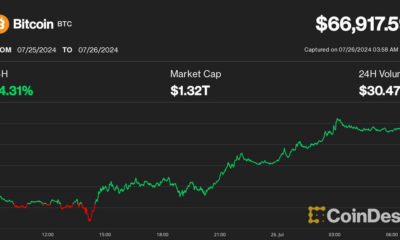Markets
CFTC Commissioner Summer Mersinger on Overzealous Crypto Regulation and the Need for Legislative Action
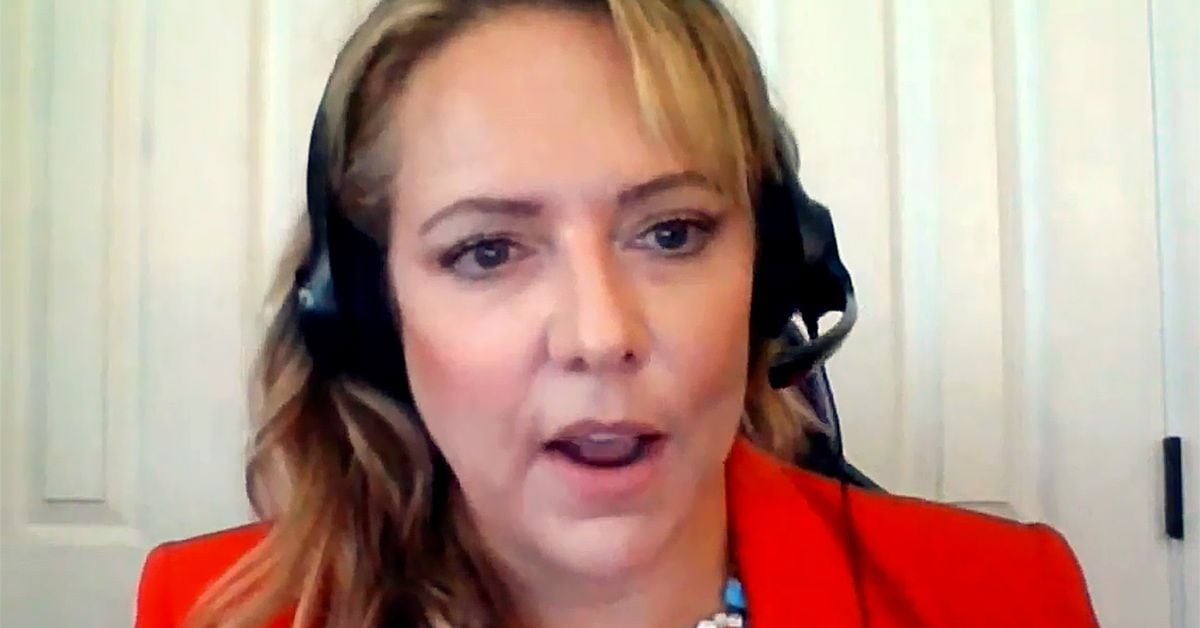
Commissioner Summer Mersinger, of the Commodity Futures Trading Commission (CFTC), is one of the few U.S. regulators who is routinely willing to defend the crypto industry and call out what she sees as overzealous oversight. She will be speaking at Consensus 2024 in Austin, Texas, on May 30.
CoinDesk caught up with Mersinger to discuss the Cain and Abel rivalry between the CFTC and U.S. Securities and Exchange Commission (SEC), how her agency decides which enforcement actions to pursue and her views on a variety of issues, including the CME possibly getting into the spot bitcoin market, the emerging world of betting markets and Washington D.C. traffic.
Is it an accurate view that the SEC and the CFTC are in somewhat of a turf war over crypto?
I think there are certainly questions around who has the appropriate authority. There are people between the two agencies who are willing to work together, in fact, at Consensus Commissioner Peirce and I will be speaking together. We have some similar views. But it is a struggle because, sometimes where debate has been leveled – whether it’s an enforcement case or another action we have said falls under our fraud and manipulation enforcement authority – we’re seeing the SEC start to ask questions as though it falls under their jurisdiction. And so there is certainly some tension there. It’s largely the lack of clarity that’s really causing the tension.
You’re in a minority position as a regulator who’s somewhat favorable to crypto. Could you just explain why it is that you’re willing to stick your neck out?
Part of the reason I went into government, generally, is that – while there’s a need for government in people’s lives – we don’t want to overstep. We also want to make sure the rules of the road are clear so that people can abide by the law. This is an area where there is a real problem. A lot of people are very interested in investing in, or trading, cryptocurrencies, and we have not provided any clarity – we’ve made it very murky. That’s not what the government should be doing. It’s creating a situation where you have people relying on the word of a regulator, and the rules of the game are being changed in the middle of the play.
I still think it’s important that we speak up and let people know that, whether you like crypto or not, that’s not the point here. The point is that regulators have really made this confusing and difficult.
Do you agree with Commissioner Pham’s idea that the Government Accountability Office should investigate the CFTC’s enforcement actions?
COMMISSIONER MERSINGER: It’s difficult to ask another agency to come in and look at the internal workings of the CFTC. I understand where Commissioner Pham is coming from and I think it’s that same kind of feeling that we shouldn’t be regulating through enforcement. But I also think this is a leadership question. I greatly respect Chairman Behnam, but this is an issue with the political direction from this White House. So, instead of an audit, we need to ask: Is the problem the agency, or the current political leadership driving our agenda and broadly stifling financial innovation?
I don’t want to put words in your mouth, but is this to suggest that the regulatory landscape would improve if Trump was re-elected in November?
There are clear differences between President Biden and former President Trump, so that does drive the regulatory agenda. So, if leadership changes, you would certainly assume there would be new policies and a new regulatory agenda.
I’m curious to what extent you’re in active dialogue with Congressmembers about potential crypto legislation?
They use us as a resource. We talk to members of the House Financial Services Committee, the Agriculture Committee, and certainly members of the Senate and work with them on where there is ambiguity in the laws or opportunities to make some delineations and clear paths for regulation. It’s offering our assistance and expertise and it’s helpful to have those conversations because they also want to make sure we’re able to implement the laws that they pass. They may have great intentions, but if it’s impossible for the agency to implement then it’s useless.
That makes a lot of sense. Do you think that there needs to be bespoke crypto legislation or would new interpretations of existing laws suffice?
There are some who believe we can use current statutory authority, whether the SEC or the CFTC, to regulate – which is where we see regulation through enforcement actions. I disagree. The only way to get past just bringing enforcement actions is to have something come out of Congress that says “here’s how to handle cryptocurrencies.”
Beyond legislation, the two agencies also need to sit down and come up with some joint rulemaking. We did that with Dodd Frank, and we certainly could do that here. That’s an important piece of making sure people know which regulator is going to regulate them, which door to walk into. There’s no question that without statutory changes to ensure it’s very clear where the jurisdiction is, agencies will try to go in separate directions.
I know every enforcement action is primarily driven by facts on the ground. But I think it might be interesting to get a view into how these cases are built. What is the process of building a case against someone like Avi Eisenberg?
Without talking about any specific enforcement cases, with a lot of these cases it’s been whistleblower reports saying “I think somebody is violating the law.” It could be a victim who says they lost money, and I don’t think what they’re doing is legal. We have a pretty large team of enforcement investigators and attorneys who start building a case. By the time it gets to us at the commission, usually the facts have been pretty well established and how they line up with the law. We’re kind of like a jury that decides whether the facts meet our statutory requirements.
A lot of it is done by the enforcement team that might interview the whistleblower and other employees, get documents. A lot of time goes into each case before it gets to the commission for a vote. There’s also a lot of cooperation between the various agencies, whether it’s the DOJ, state regulators or the SEC. So where there’s opportunities to bring cases under multiple statutes, or different regulators, they’ll work together. It’s more efficient for the government if they can work together. They can also tip each other off. If we had to get every lead, I think it’d be really difficult.
Now one distinction I want to make is you hear a lot of numbers around crypto enforcement cases. I think it’s a little unfair because a lot of these cases are just run of the mill fraud; somebody stealing someone else’s money, someone claiming to buy crypto, but not actually buying the crypto. So we’ve seen this play out with whatever the hot topic is at the time. I’d say every few years the theme changes – it was foreign currencies, it was metals, we saw a lot of gold fraud. Right now crypto is the hot thing. A lot of cases have been portrayed as cryptocurrency fraud, but it’s just fraud with a crypto wrapper around it. So tomorrow, it might be AI fraud.
I almost hate to say it, but given how much fraud centers around crypto, do you think that there should be more enforcement actions?
I think when it’s straight up fraud, yes. There’s a distinction here when you have a case where somebody just takes your money and claims to invest in something and never does – there’s no question who has the authority there. The more we can try to shut some of this down, the better.
But where there’s a policy question around a certain activity and how our statute would fit with that activity, that’s where I get a little nervous. For instance, if we’re looking at a DeFi protocol, and we’re saying they’re violating our statute it can be difficult if we’ve never really said how our statute applies to DeFi.
We’re starting to set out definitions and interpretations based on court cases, because sometimes you’ll find use cases where there are bad actors. Sometimes it’s people who want to abide by the law, but there’s no clear way how they would do that. That’s why I think we’d be better off with rulemaking.
What do you make of the argument that the SEC implicitly said that Ethereum is a commodity when futures went live in 2021?
So this is an interesting question in development. We do have futures products trading on ether. And I do think if somebody decides that ether is a security, it calls into question what happens. We’ve [the CFTC] been regulating those contracts. They operated well, we have no concerns. This was an area where we thought there was clarity, and now we’re not quite sure if there’s clarity and that’s dangerous.
The law is a little strange; commodities can be a lot of other things – you can have a commodity that is a security. The nomenclature gets a little tricky the way the law is written. But we’ve said we believe this is a commodity and we’re going to regulate it as such under CFTC jurisdiction because it is a derivative product. To me that has been clearly laid out and we shouldn’t be introducing new kinds of questions around what has been a clear policy.
Given how interrelated these assets are, do you think the U.S. would be better off with a single unified agency, like the U.K.’s FCA?
I’m always hesitant to recommend any new government agencies or adding more government. History has shown that more government has never been the answer. But I do think sometimes you’ve got to better tailor statutes. Crypto doesn’t neatly fit into any of our financial categories, so we’re gonna have to fine tune some of the law. That’s what Congress does, so we can easily do this without any new agency.
Why is the CFTC so against betting markets?
It’s a very tough, difficult topic because there’s a lot of nuance. So these markets, which we call event contracts, are part of our statute that was added under the Dodd Frank Act. In the grand scheme of things, it’s relatively new, but we’ve seen interest in these contracts for quite some time and it’s certainly ramping up. The way Congress laid it out for us it said these contracts generally are OK, as long as they don’t touch on a number of topics, like gaming, war, terrorism, assassination – anything that’s against federal law. There are a number of people who really don’t like election contracts and would like to include them in this list.
Then there’s this public interest piece that tries to determine whether having this contract would be against the public interest. It’s not necessarily that we are against these markets, but there have to be some guardrails. Congress directed us to have some guardrails, and we’re trying to build them. You see that with our recent vote. My feeling is if that’s the route you want to take, you still have to do a public interest determination for every contract, which is why I dissented because we were limiting elections as a category.
At the end of the day, we want to create a framework where if you’re registered with us, you won’t have a legal question every time you try to do something new. We are just struggling a little bit with the approach. Congress tried to help us create clarity, but certainly left a lot of a lot left to the regulator to figure out.
The Financial Times reported today that CME is thinking about listing spot bitcoin trading, not not just bitcoin futures. Is that something that you are supportive of?
You know, the first time I heard about it was this morning as well, so I haven’t had those conversations. I want to talk a little bit more with CME and with our staff to find out what this means. There’s a lot of questions around custody and other issues. So right now, I don’t have a positive or negative opinion and honestly, as a regulator, I shouldn’t. They should be able to make those market decisions as long as they’re following the rules. We try to be a regulator that is principles based and let our registered entities run the markets, because that’s what they do. Our job is just to make sure everyone’s following the rules.
Quick round of overrated/underrated? You could decline to answer or clarify your position. DeFi?
I don’t have a position one way or the other. I just think as a regulator, we should have clear rules of the road for DeFi.
You know, I’m gonna say Washington D.C. is a little overrated. Mostly because I was just in the Midwest where there was no traffic. It was very pleasant.
Neutral. You know, I’ve never met him. So I try to withhold my opinions of people until I’ve had a chance to sit down and get to know them.
The phrase “sufficiently decentralized?”
You’re either decentralized or you’re not. So I think sufficiently decentralized feels a little overrated because I don’t know what that means. It probably means you’re not decentralized.
What are you most looking forward to at Consensus?
The conversations with so many different stakeholders. This is an opportunity to talk with people we ordinarily wouldn’t see in Washington, D.C. and to have them all in one place is really special.
Thank you again for the time. Nice to meet you both.
Markets
Today’s top crypto gainers and losers

Over the past 24 hours, Jupiter and JasmyCoin emerged as the top gainers among the top 100 crypto assets, while Bittensor and Mantra plunged as the top losers.
Top Winners
Jupiter
Jupiter (JUP) led the charge among the biggest gainers on July 27.
At the time of writing, the crypto asset had surged 12.6% in the past 24 hours and was trading at $1.16. JUP’s daily trading volume was hovering around $282 million, according to data from crypto.news.
JUP Hourly Price Chart, July 26-27 | Source: crypto.news
Additionally, the cryptocurrency’s market cap stood at $1.56 billion, making it the 62nd largest crypto asset, according to CoinGecko. Despite the recent price surge, the token is still down 42.6% from its all-time high of $2 reached on Jan. 31.
Jupiter functions as a decentralized exchange aggregator that allows users to trade Solana-based tokens. The platform also offers users the best routes for direct trades between multiple exchanges and liquidity pools.
In addition to being a DEX aggregator, Jupiter has expanded into a “full stack ecosystem” by launching several new projects, including a dedicated pool to support perpetual trading and plans for a stablecoin.
JasmyCoin
JasmyCoin (JASMI) has increased by 12% in the last 24 hours and is trading at $0.0328 at press time. JASMY’s daily trading volume has increased by 10% in the last 24 hours, reaching $146 million.
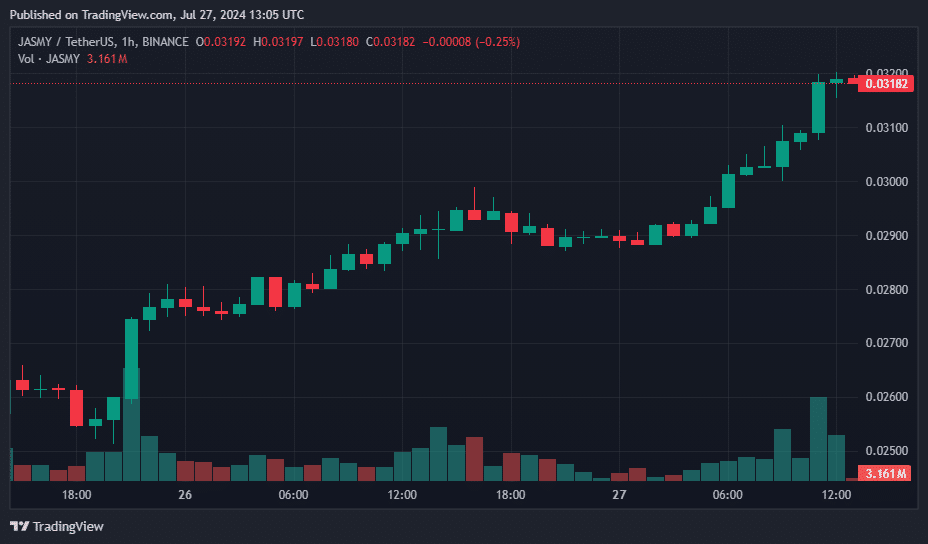
JASMY Hourly Price Chart, July 26-27 | Source: crypto.news
The asset’s market cap has surpassed the $1.5 billion mark, making it the 60th largest cryptocurrency at the time of reporting. However, the self-proclaimed “Bitcoin of Japan” is still down 99.3% from its all-time high of $4.79 on February 16, 2021.
JASMY is the native token of Jasmy Corporation, a Japanese Internet of Things provider. The platform seeks to merge the decentralization of blockchain technology with IoT, allowing users to convert their digital information into digital assets.
The initiative was launched by Kunitake Ando, former COO of Sony Corporation, along with Kazumasa Sato, former CEO of Sony Style.com Japan Inc., Hiroshi Harada, executive financial analyst at KPMG, and other senior executives from Japan.
Kaspa
Kaspa (KAS) saw a 100% increase in trading volume and an 8% increase in price over the past 24 hours, trading at $0.19 at the time of publication.
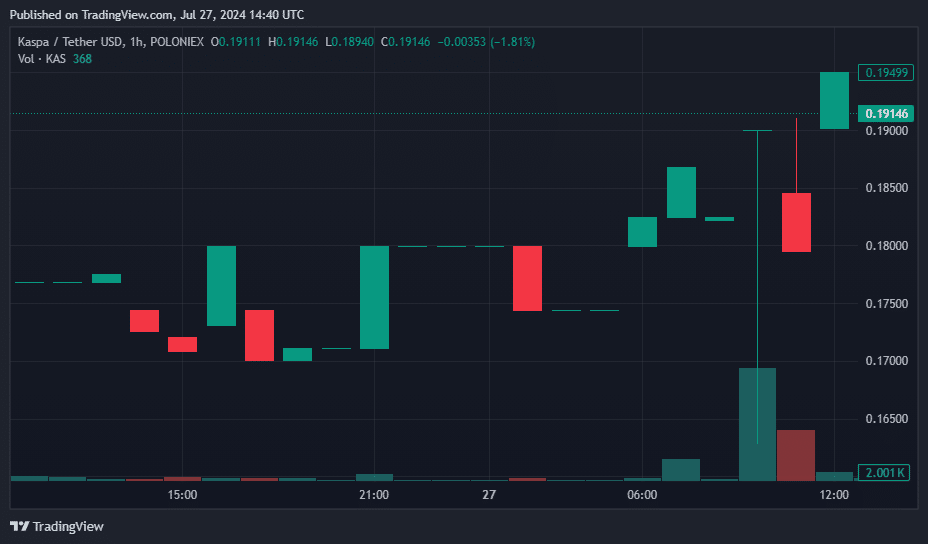
KAS Hourly Price Chart, July 26-27 | Source: crypto.news
According to data from CoinGecko, Kaspa now ranks 27th in the global cryptocurrency list, with a circulating supply of approximately 24.29 billion KAS tokens and a market capitalization of $4.59 billion.
Kaspa is a cryptocurrency designed to deliver a high-performance, scalable, and secure blockchain platform. Its unique Layer-1 protocol includes the GhostDAG protocol, a proof-of-work (PoW) consensus mechanism that enables faster block times and higher transaction throughput compared to standard blockchains.
Unlike Bitcoin, GhostDAG allows multiple blocks to be created simultaneously, speeding up transactions and increasing block rewards for miners.
Bonk
Bonk (BONK) is the only one coin meme which made it to this list of biggest gainers and jumped 8.6% in the last 24 hours. Trading at $0.000030, the Solana-based meme coin’s market cap has surpassed $2.1 billion, surpassing Floki (FLOKI), another competing dog-themed coin with a market cap of $1.78 billion.
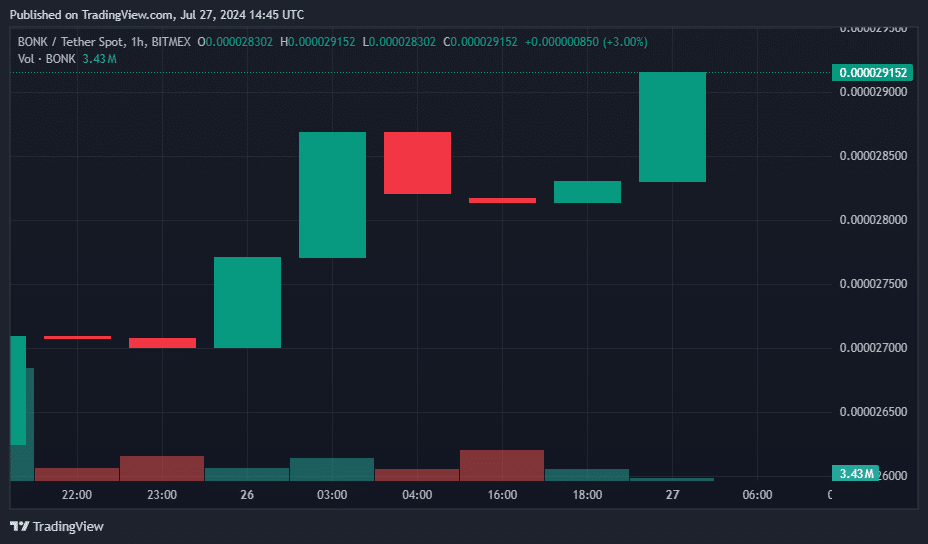
BONK Hourly Price Chart, July 26-27 | Source: crypto.news
BONK’s daily trading volume hovered around $285 million. However, BONK is still down 33.5% from its all-time high of $0.000045, reached on March 4.
Bonk, a meme coin that rose to prominence in 2023, has contributed significantly to Solana’s value increase amid the meme coin frenzy.
Bonk started out as a simple dog-themed coin. It has since expanded its features to include integration with decentralized finance. The project also partners with cross-chain communication protocols, NFT marketplaces, and various other cryptocurrency ecosystems.
BONK trading pairs are now listed on major exchanges including Binance, Coinbase, OKX, and Bitstamp.
The big losers
Bittensor
Bittensor (TAO) was the biggest loser among the 100 largest crypto assets, according to data from CoinGecko.
At the time of writing, TAO, the native token of decentralized AI project Bittensor, was down 5%, trading around $344. The crypto asset had a daily trading volume of $59 million and a market cap of $2.43 billion.
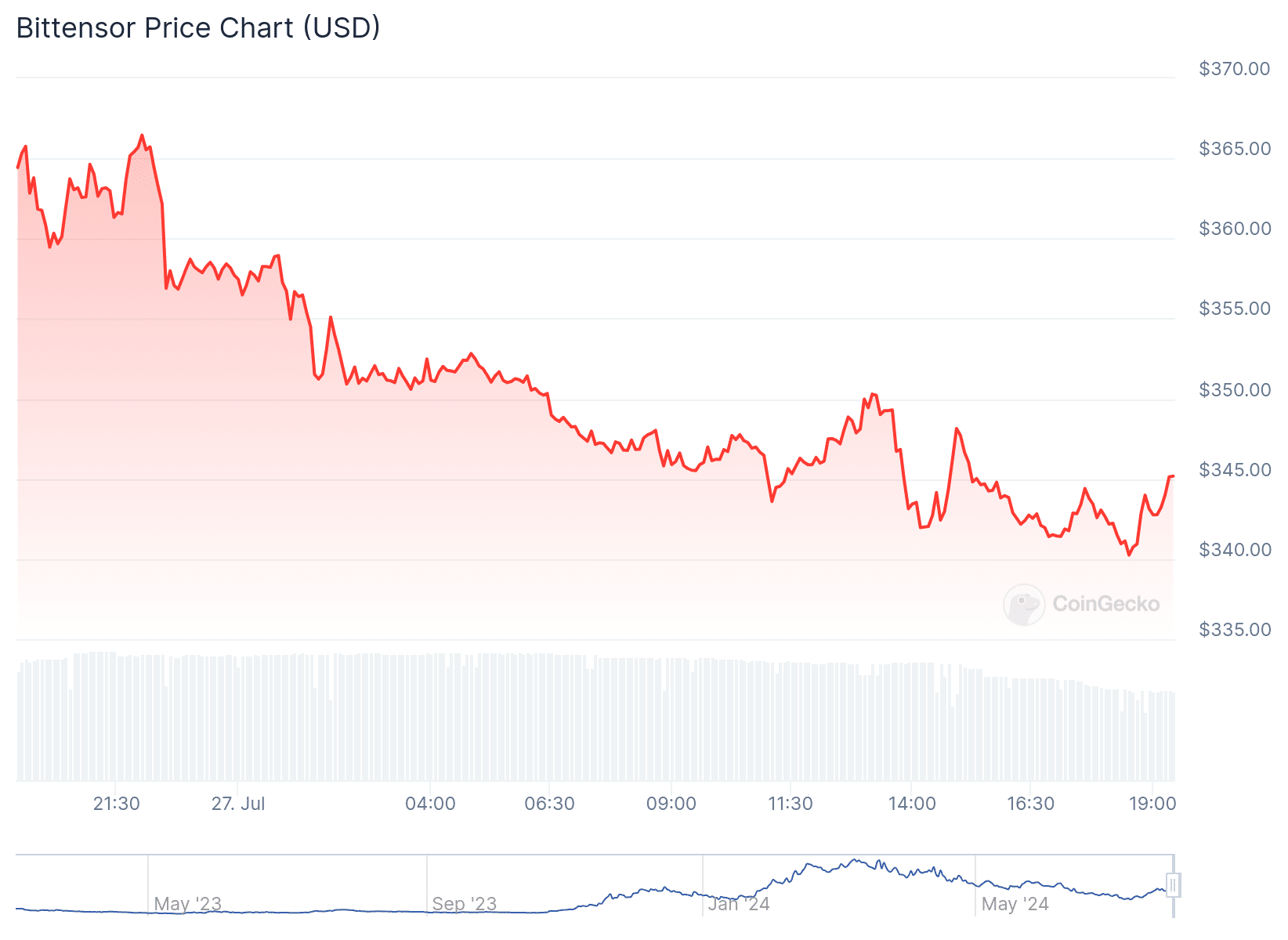
TAO 24 Hour Price Chart | Source: CoinGecko
Bittensor, created in 2019 by AI researchers Ala Shaabana and Jacob Steeves, initially operated as a parachain on Polkadot before transitioning to its own layer-1 blockchain in March 2023.
Mantra
Mantra (OM) fell 6%, trading at $1.13 at press time. The digital currency’s market cap fell to $938 million. Additionally, the 82nd largest crypto asset has a daily trading volume of $26 million.
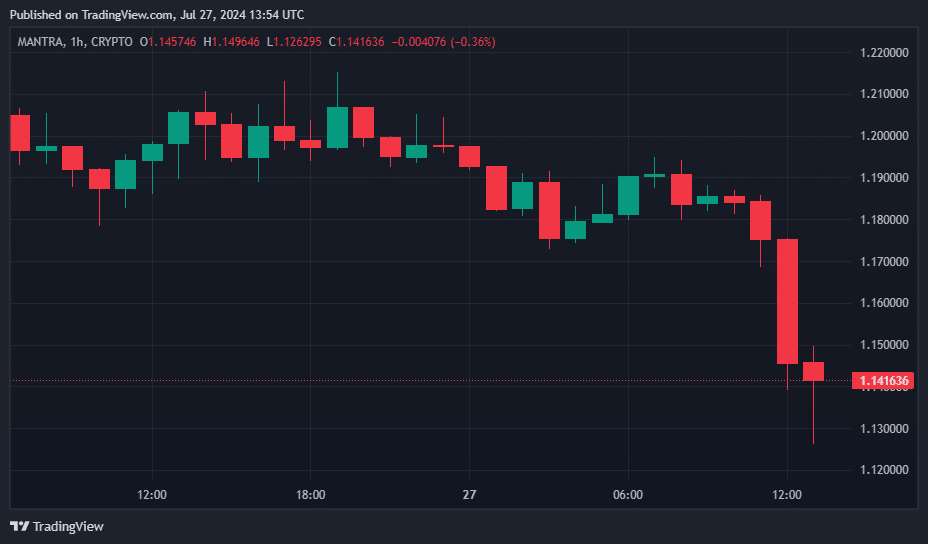
OM Price Hourly Chart, July 26-27 | Source: crypto.news
Mantra is a modular blockchain network comprising two chains, Manta Pacific and Manta Atlantic, specialized in zero-knowledge applications.
Coat
Coat (MNT) also saw a 2.4% drop in price, now trading at $0.8413. Currently, Mantle has a market cap of around $2.75 billion, which ranks 36th in the global cryptocurrency rankings by market cap, according to price data from crypto.news.
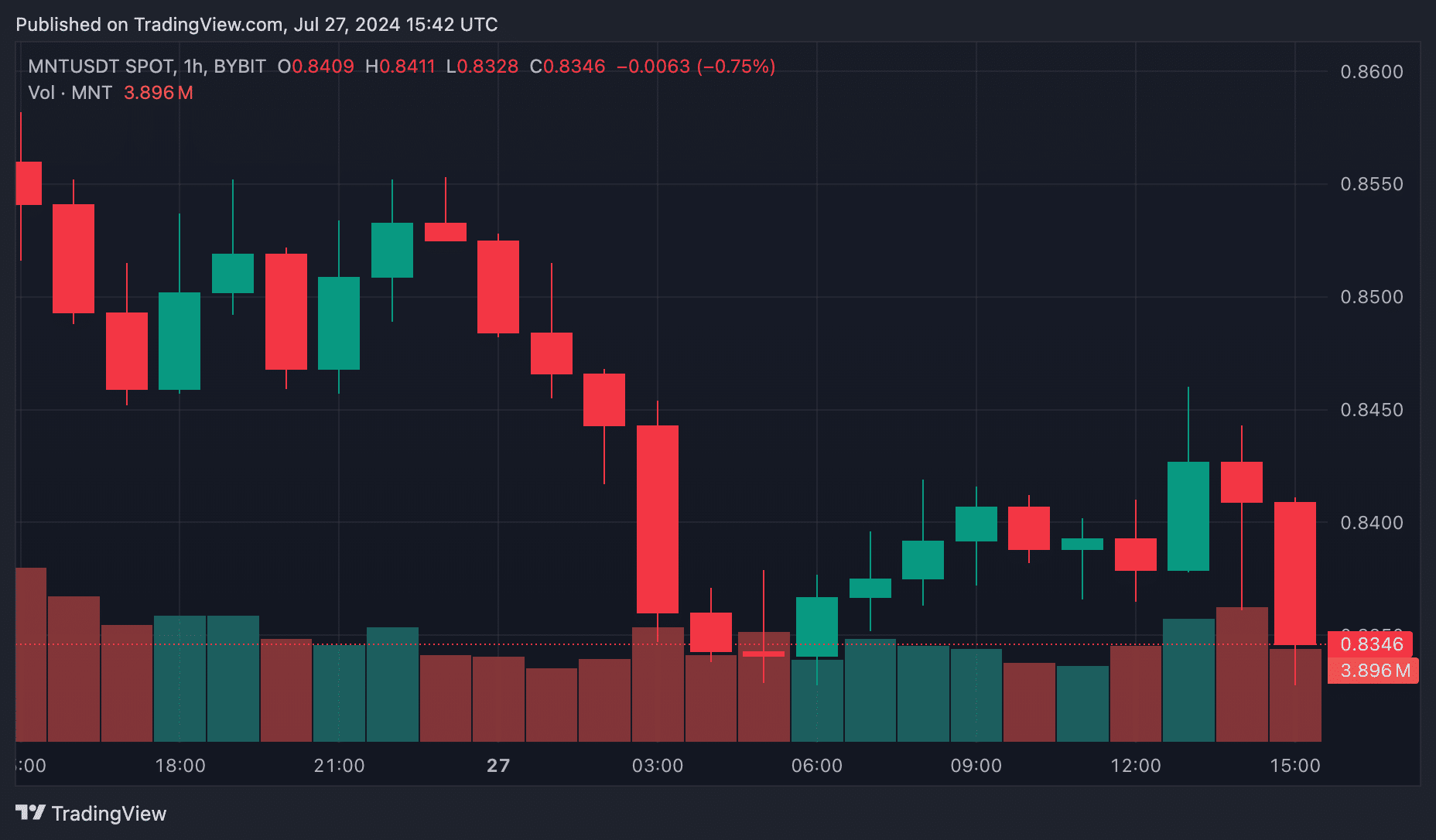
MNT Hourly Price Chart, July 26-27 | Source: crypto.news
Over the past 24 hours, MNT trading volume also fell by 6%, reaching $240 million.
Mantle, formerly known as BitDAO, is an investment DAO closely associated with Bybit. The MNT token is essential for governance, paying gas fees on the Mantle network, and staking on various platforms.
Built on the Ethereum network, Mantle provides a platform for decentralized application developers to launch their projects. It has become particularly popular for GameFi applications, leading to the formation of an internal Web3 gaming team.
Markets
Bitcoin Price Drops to $67,000 Despite Trump’s Pro-Crypto Comments, Further Correction Ahead?

Pioneer cryptocurrency Bitcoin has registered a 1.13% decline in the past 24 hours to trade at $67,400. Despite a strong pro-crypto stance from US presidential candidate Donald Trump at the Bitcoin 2024 conference, this massive selloff has raised concerns in the market about the asset’s sustainability at a higher price. However, given the recent three-week rally, a slight pullback this weekend is justifiable and necessary to regain the depleted bullish momentum.
Bitcoin Price Flag Formation Hints at Opportunity to Break Beyond $80,000
The medium-term trend Bitcoin Price remains a sideways trend amidst the formation of a bullish flag pattern. This chart pattern is defined by two descending lines that are currently shaping the price trajectory by providing dynamic resistance and support.
On July 5, BTC saw a bullish reversal from the flag pattern at $53,485, increasing its asset by 29.75% to a high of $69,400. This recent spike followed the market’s positive sentiment towards the Donald Trump speech at the Bitcoin 2024 conference in Nashville on Saturday afternoon.
Bitcoin Price | Tradingview
In his speech, Trump outlined several pro-crypto initiatives: he promised to replace SEC Chairman Gary Gensler on his first day in office, to establish a Strategic National Reserve of Bitcoin if elected, to ensure that the U.S. government holds all of its assets. Bitcoin assets and block any attempt to create a central bank digital currency (CBDC) during his presidency.
He also claimed that under his leadership, Bitcoin and cryptocurrencies will skyrocket like never before.
Despite Donald Trump’s optimistic promises, the BTC price failed to reach $70,000 and is currently trading at $67,400. As a result, Bitcoin’s market cap has dipped slightly to hover at $1.335 trillion.
However, this pullback is justified, as Bitcoin price has recently seen significant growth over the past three weeks, which has significantly improved market sentiment. Thus, price action over the weekend could replenish the depleted bullish momentum, potentially strengthening an attempt to break out from the flag pattern at $70,130.
A successful breakout will signal the continuation of the uptrend and extend the Bitcoin price forecast target at $78,000, followed by $84,000.
On the other hand, if the supply pressure on the upper trendline persists, the asset price could trigger further corrections for a few weeks or months.
Technical indicator:
- Pivot levels: The traditional pivot indicator suggests that the price pullback could see immediate support at $64,400, followed by a correction floor at $56,700.
- Moving average convergence-divergence: A bullish crossover state between the MACD (blue) and the signal (orange) ensure that the recovery dynamics are intact.
Related Articles
Frequently Asked Questions
A CBDC is a digital form of fiat currency issued and regulated by a country’s central bank. It aims to provide a digital alternative to traditional banknotes.
The proposal for a strategic national Bitcoin reserve is a major confirmation of Bitcoin’s legitimacy and potential as a reserve asset. Such a move could position Bitcoin in a similar way to gold, potentially stabilizing its price and encouraging other countries to adopt similar strategies.
Conferences like Bitcoin 2024 serve as essential platforms for networking, knowledge sharing, and showcasing new technologies within the cryptocurrency industry.
Markets
Swiss crypto bank Sygnum reports profitability after surge in first-half trading volumes – DL News

- Sygnum says it has reached profitability after increasing transaction volumes.
- The Swiss crypto bank does not disclose specific profit figures.
Sygnum, a Swiss global crypto banking group with approximately $4.5 billion in client assets, announced that it has achieved profitability after a strong first half, with key metrics showing year-to-date growth.
The company said in a Press release Compared to the same period last year, cryptocurrency spot trading volumes doubled, cryptocurrency derivatives trading increased by 500%, and lending volumes increased by 360%. The exact figures for the first half of the year were not disclosed.
Sygnum said its staking service has also grown, with the percentage of Ethereum staked by customers increasing to 42%. For institutional clients, staking Ethereum has a benefit that goes beyond the limitations of the ETF framework, which excludes staking returns, Sygnum noted.
“The approval and launch of Bitcoin and Ethereum ETFs was a turning point for the crypto industry this year, leading to a major increase in demand for trusted, regulated exposure to digital assets,” said Martin Burgherr, Chief Client Officer of Sygnum.
He added: “This is also reflected in Sygnum’s own growth, with our core business segments recording significant year-to-date growth in the first half of the year.”
Sygnum, which has also been licensed in Luxembourg since 2022, plans to expand into European and Asian markets, the statement said.
Markets
Former White House official Anthony Scaramucci says cryptocurrency bull market could be sparked by regulatory clarity

Anthony Scaramucci, founder of Skybridge Capital, says the next cryptocurrency bull market could be sparked by a new wave of clear cryptocurrency regulations.
In a new interview On CNBC’s Squawk Box, the former White House communications director said he and two other prominent industry figures traveled to Washington, D.C. to speak to officials about the dangers of Sen. Elizabeth Warren and U.S. Securities and Exchange Commission (SEC) Chairman Gary Gensler’s hardline approach to cryptocurrency regulation.
“Mark Cuban, myself, and Michael Novogratz were in Washington a few weeks ago to speak with White House officials and explain the dangers of Gary Gensler and Elizabeth Warren’s anti-crypto approach. I hope that message gets through…
“Overall, if we can get regulatory policy around Bitcoin and crypto assets in sync, we will have a bull market next year for these assets.”
Scaramucci then compares crypto assets to ride-hailing company Uber, saying regulators were initially wary of the service but eventually decided to adopt clear guidelines due to public demand.
“Remember Uber: Nobody wanted Uber. A lot of regulators didn’t want it. Mayors and deputy mayors didn’t want it, but citizens wanted Uber and eventually accepted the idea of regulating it fairly. I think we’re there now.”
The CEO also says young Democratic voters believe their leaders are making the wrong choices when it comes to digital assets.
“I think President Trump’s move toward Bitcoin and crypto assets has shaken Democrats to their core, and I think very smart, younger Democrats are recognizing that they are completely off base with their positions, completely off base with these SEC lawsuits and regulation by law enforcement, and now they need to get back to the center.”
Don’t miss a thing – Subscribe to receive email alerts directly to your inbox
Check Price action
follow us on X, Facebook And Telegram
Surf The Daily Hodl Mix
 
Disclaimer: Opinions expressed on The Daily Hodl are not investment advice. Investors should do their own due diligence before making any high-risk investments in Bitcoin, cryptocurrencies or digital assets. Please be advised that your transfers and trades are at your own risk, and any losses you may incur are your responsibility. The Daily Hodl does not recommend the buying or selling of any cryptocurrencies or digital assets, nor is The Daily Hodl an investment advisor. Please note that The Daily Hodl participates in affiliate marketing.
Image generated: Midjourney
-

 Videos1 month ago
Videos1 month agoAbsolutely massive: the next higher Bitcoin leg will shatter all expectations – Tom Lee
-

 News12 months ago
News12 months agoVolta Finance Limited – Director/PDMR Shareholding
-

 News12 months ago
News12 months agoModiv Industrial to release Q2 2024 financial results on August 6
-

 News12 months ago
News12 months agoApple to report third-quarter earnings as Wall Street eyes China sales
-

 News12 months ago
News12 months agoNumber of Americans filing for unemployment benefits hits highest level in a year
-

 News1 year ago
News1 year agoInventiva reports 2024 First Quarter Financial Information¹ and provides a corporate update
-

 News1 year ago
News1 year agoLeeds hospitals trust says finances are “critical” amid £110m deficit
-

 Markets1 year ago
Markets1 year agoWhale Investments in Bitcoin Hit $100 Billion in 2024, Fueling Insane Investor Optimism ⋆ ZyCrypto
-

 DeFi1 year ago
DeFi1 year ago🏴☠️ Pump.Fun operated by Insider Exploit
-

 Videos1 year ago
Videos1 year ago$1,000,000 worth of BTC in 2025! Get ready for an UNPRECEDENTED PRICE EXPLOSION – Jack Mallers
-

 Videos1 year ago
Videos1 year agoABSOLUTELY HUGE: Bitcoin is poised for unabated exponential growth – Mark Yusko and Willy Woo
-

 Tech1 year ago
Tech1 year agoBlockDAG ⭐⭐⭐⭐⭐ Review: Is It the Next Big Thing in Cryptocurrency? 5 questions answered









